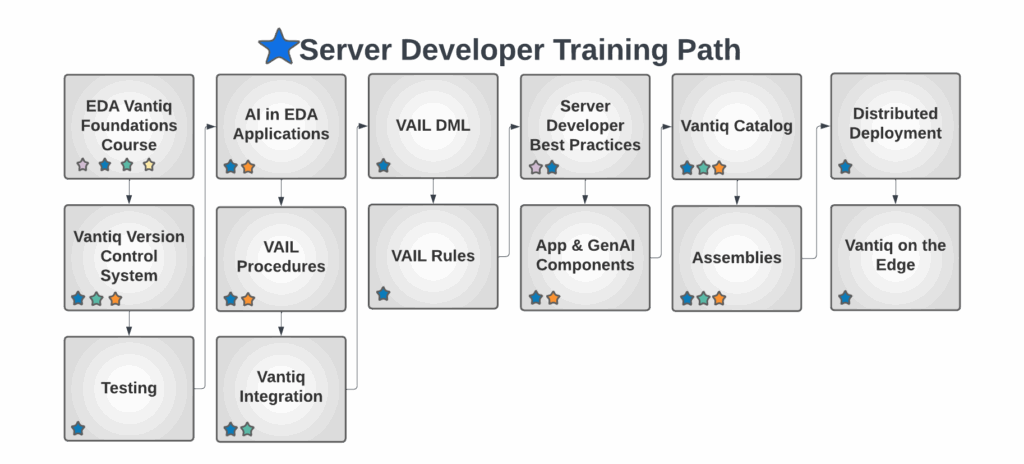Server Developers take the project vision and build it! This role requires a wide variety of abilities in order to carry out the following tasks:
- Organize project resources by functionality in Services
- Manage application state
- Handle event processing, either visually or programmatically
- Develop using the best performance and scalability strategies for the needs of the project
- Build and run unit and integration test suites
- Make program functionality as modular, reusable and shareable as possible
- Deploy applications to other installations and system platform architectures
The courses that comprise the Developer Training Pathway are:

- Vantiq Version Control System – (1 Hour) – The VCS is a tool in the IDE that copies project files to a local filesystem, so the files and their changes can be managed by versioning software. It’s also useful for integrating the work of multiple developers into a single project.
- Vantiq’s Testing Tools – (2 Hours) – Building regression tests for highly asynchronous processing can be daunting, but Vantiq has tools in place to facilitate creating automated unit and integration suites to ensure the project is on track for its functional and performance goals.
- AI in Event-Driven Applications – (2 Hours) – Here’s the full story on how to add powerful AI capabilities and Collaboration conversation management into your Visual Event Handlers.
- VAIL Procedures – (1 Hour) – The Vantiq Application Integration Language is the platform’s easy-to-learn and very versatile proprietary language. Developers use procedures to invoke program logic, manage state and augment event processing.
- Vantiq Integration – (3 Hours) – This elective first introduces many of Vantiq’s integration tools and features, before delving deeply into how developers access Vantiq’s Application Programming Interface.
- VAIL DML – (1 Hour) – The VAIL Data Manipulation Language is very SQL-like, and concerns interactions with persistent data in a database.
- VAIL Rules – (1 Hour) – Rules are VAIL code that is triggered by specific conditions within the system. Rules allow for great precision in event processing.
- Server Developer Best Practices – (.5 Hours) – How performance and scalability in a project can best be achieved is not a “one size fits all” approach in all cases. In this course, students learn that of the different methods of achieving the same result, there are usually trade-offs in other areas. Students learn to weigh these different outcomes and choose those that best meet their business needs.
- App & GenAI Components – (2 Hours) – Developers who find themselves building the same functionality in Visual Event Handlers (Apps) or GenAI procedures can save time and effort by turning that functionality into Components. This elective demonstrates how to build complex, yet flexible Components that are easy for consumers to seamlessly plug into their own projects.
- Vantiq Catalog – (1 Hour) – The Vantiq Catalog creates connections to share events and resources across namespaces. This elective reviews the Catalog Event Broker from the Vantiq Developer Level 1 class, then covers more advanced topics such as Public Catalogs, Service Catalogs and how to share Assemblies via a Catalog.
- Assemblies – (2 Hours) – Assemblies are ways that developers can create shareable custom projects, in a modular format that keeps future Assembly users free from the programming details inside them. With Vantiq Assemblies, it is possible to create whole reusable application libraries and make them available through Catalogs to all authorized users.
- Distributed Deployment – (2 Hours) – Partition your project resources and use the Deployment Tools to distribute them across multiple nodes; achieving a fully load-balanced and distributed application system.
- Vantiq on the Edge – (2.5 Hours) – By installing Vantiq servers on Edge devices, Vantiq goes where the events are, reducing network latency in processing. Installing Vantiq on laptops, micro controllers, and multi-access edge (MEC) systems maximizes the advantages of fully-distributed systems and parallel processing capability.
